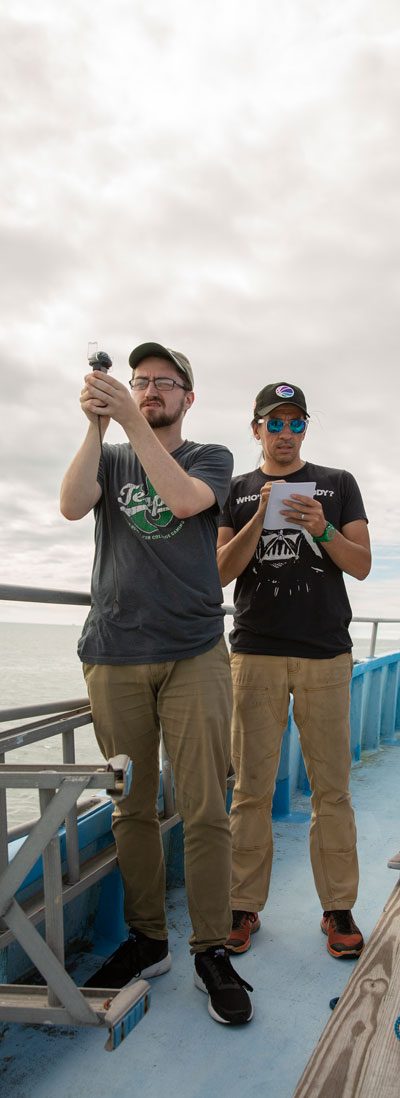
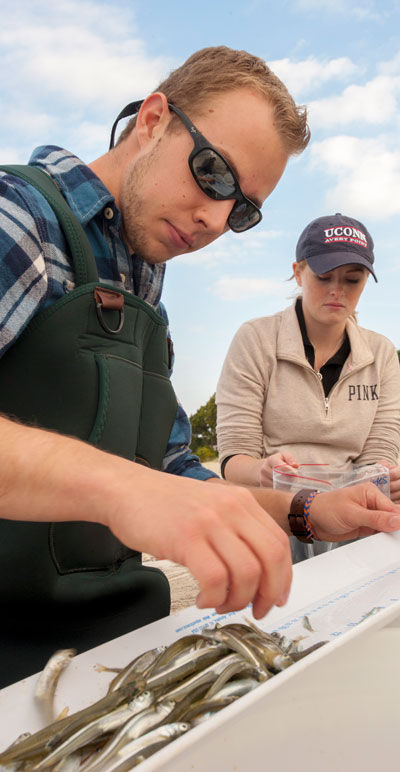
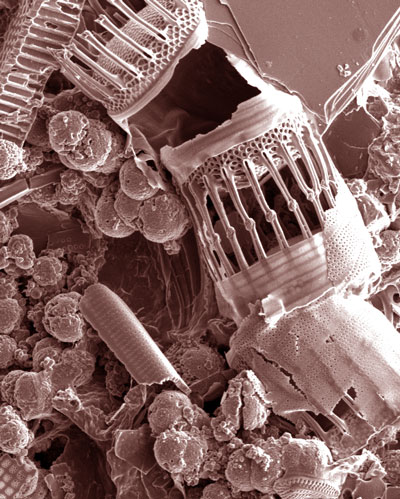
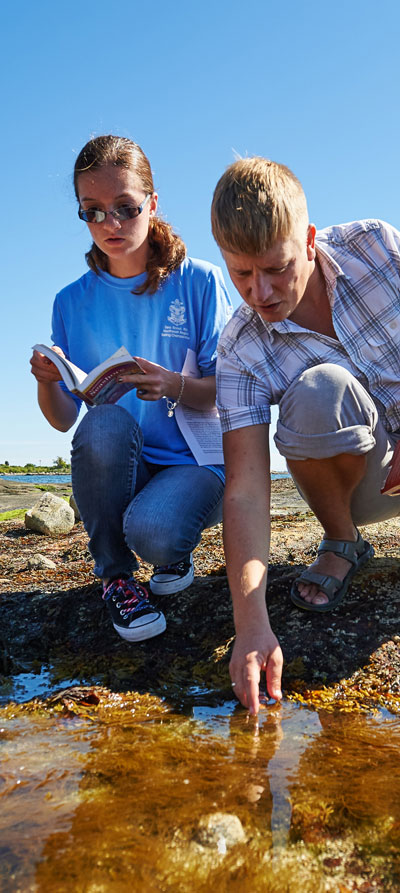
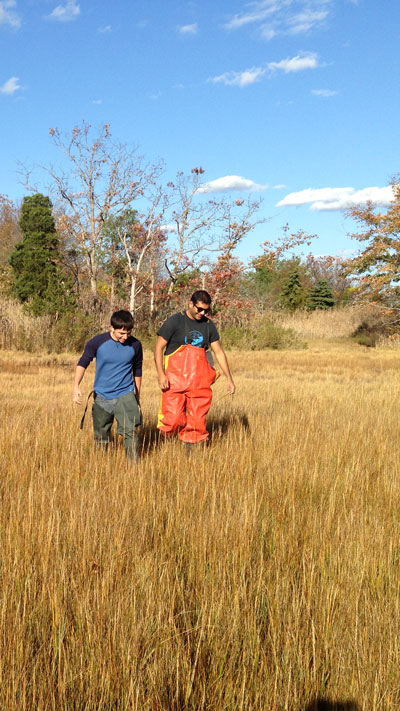

Marine Biology Minor
The Marine Biology Minor is offered by the Department of Marine Sciences. It requires a minimum of 15 credits (2000-level or above course work).
Required courses are: MARN 3014/EEB 3230; MARN 4010*
In addition, students must take at least three electives from the following courses:
- MARN 2801WE
- MARN 3012/MARN 5012 or EEB 4275
- MARN 3015*/MARN 5015*
- MARN 3017*/MARN 5017*
- MARN 3811
- MARN 3812/MARN 5812*
- MARN 4018/MARN 5018 or EEB 4200
- EEB 3250
- MARN 4210Q*
- MCB 3849W
- NRE 4335 or NRE 3385W
- ERTH 4130/MARN 4130
*Course offered only at the Avery Point campus
With written pre-approval of the Marine Biology Minor Coordinator, the following courses may be substituted for one of the three electives: MARN 2899/3899/4899 or EEB 3899 or MCB 3899; MARN 2995/3995/4995 or EEB 3895 or MCB 3895; MARN 4898 or EEB 3898 or MCB 3898; MARN 2893/3893/4893 or EEB 2893/3893 or MCB 3893/4893.
Students may not count the same course towards the Marine Sciences minor or the Marine Sciences major offered by the Department of Marine Sciences.

Required Courses
MARN 3014/EEB 3230: Marine Biology
First semester (Storrs); second semester, alternate years (Avery Point). Three credits. Two class periods and one 2-hour laboratory period. Prerequisite: One year of college laboratory biology. The study of the kinds and distributions of marine organisms. Particular attention is paid to biotic features of the oceans, organism-habitat and relationships and general ecological concepts influencing marine populations and communities. Field trips are required. A fee of $10 is charged for this course.
MARN 4010: Biological Oceanography*
Second semester. Three credits. Prerequisite: CHEM 1128Q; MATH 1132Q; PHYS 1202Q or equivalent; BIOL 1107 and 1108; or instructor consent. Structure and function of marine food webs, from primary producers to top trophic levels; interaction of marine organisms with the environment; energy and mass flow in food webs; elemental cycling; coupling between pelagic and benthic environments.

Course Electives (students must take at least 3 of the following courses**)
MARN 2801WE: Marine Sciences and Society
Three credits. Scientific analysis of coastal zone issues and interdisciplinary implications for society, including theories, observations, and models of how humans impact the health and well-being of the natural world and how the natural world impacts the health of humans. Topics incorporate public policies, legal frameworks, and moral and/or ethical dimensions regarding the environment. Written analysis and discussion of primary literature.
MARN 3012: Marine Invertebrate Biology or EEB 4275: Invertebrate Zoology
MARN 3012: Three credits. Prerequisite: BIOL 1107 and 1108; Recommended preparation: MARN 1002 or 1003 or instructor consent. Comparative examination of major adaptations and functional responses of marine invertebrates to biotic and abiotic factors in the marine environment. Field trips required.
EEB 4275: Four credits. Two class periods and one 4-hour laboratory period. Prerequisite: Six credits of introductory biology. Body organization, functional morphology and evolution compared among major invertebrate phyla. Field trips required.
MARN 3015/5015: Molecular Approaches to Biological Oceanography
Three credits. Two-hour lecture, three-hour lab. Recommended preparation: one of BIOL 1108, MARN 4010, MCB 3010. Principles and technology in nucleic acid purification and manipulation, DNA fingerprinting, gene cloning and sequencing, phylogenetic analysis, and detection of gene expression (mRNA and protein). Application examples in marine ecological studies.
MARN 3017/5017: Plankton Ecology
Three credits. Two 50-minute lectures and one 3-hour lab/recitation period. Prerequisites: MATH 1060Q or 1131Q; PHYS 1201Q or 1401Q; CHEM 1122 or equivalent; BIOL 1107 and 1108. Recommended preparation: MARN 1002. Consent of instructor for graduate students in lieu of requirements. Students who have passed both MARN 5014 and MARN 5016 cannot take this course for credit. Ecology of planktonic organisms (bacteria, protista and metazoa). The evolutionary ecology concept, methods of research, special features of aquatic habitats; adaptations to aquatic environments; population biology; predation, competition, life histories, community structure, and role of plankton in ecosystem metabolism.
MARN 3811: Seminar on Marine Mammals
Joint program with Mystic Marinelife Aquarium. Three credits. One 3-hour class period; one field trip. Offered at Mystic Marinelife Aquarium. Prerequisite: one year college laboratory biology and permission of instructor. Instructors from different areas of expertise discuss the natural history, evolution, anatomy, physiology, husbandry, and conservation of marine mammals. Current research is emphasized. (Special registration and fee: Contact Mystic Marinelife Aquarium, Mystic, CT 06355. 860-572-5955.)
MARN 3812: Seminar in Marine Biodiversity and Conservation
Three credits. Critical examination of state-of-the-art research, policy and regulatory frameworks of marine conservation biology and associated environmental, cultural, and socio-economic implications. Topics may include aquaculture, endangered species, strandings, biomedicine, ocean pollution, and marine protected areas. Research projects to be conducted at Mystic Aquarium.
EEB 3250: Biology of the Algae
(Also offered as EEB 5250.) Four credits. Three lectures and one 4-hour laboratory. Prerequisite: BIOL 1108 or 1110 or instructor consent; open to juniors or higher. Laboratory and field-oriented study of major groups of algae, emphasizing structure, function, evolution, systematics, and ecology.
MARN 4018/5018: Ecology of Fishes or EEB 4200: Biology of Fishes
MARN 4018/5018: Three credits. Prerequisite: MARN 3014. General concepts in fish ecology such as distribution, feeding, bioenergetics, growth, larval fish ecology, biotic interactions, life history evolution and other contemporary research topics.
EEB 4200: (Also offered as EEB 5200.) Four credits. Three class periods and one 3-hour laboratory period. Prerequisite: BIOL 1108. An introduction to the biology of fishes, with an emphasis on adaptation and evolutionary diversification. Topics include the evolution of major groups, morphology, physiology, behavior, and population and community ecology. Lectures, critical discussions of current journal articles, student presentations, and exercises in the field and laboratory. Field trips required.
MARN 4210Q: Experimental Design in Marine Ecology
Three credits. Introduction to experimental design and data analysis for marine biology and ecology. Analysis and visualization of experimental data using the statistical software package R. Topics include analysis of variance, replication and pseudoreplication, factorial designs, and significance testing.
MCB 3849W: Symbiosis: The Science of Living Together
Three credits. All animals and plants enter into lifelong associations with beneficial microorganisms that have a profound impact on host development and health. Readings from the scientific literature will explore the molecular mechanisms by which these complex associations are established and maintained in various model systems. Prerequisites: MCB 2610 and ENGL 1007 or 1010 or 1011 or 2011. Recommended preparation: any additional 2000-level MCB course.
NRE 4335: Fisheries Management or NRE 3385W: Fisheries Techniques
NRE 4335: Three credits. Introduction to fisheries management principles with application to the biotic, habitat, and human components of fisheries. Selected topics include harvest regulations, stocking, population dynamics, endangered species, and habitat management practices in coastal and freshwater fisheries. Students will practice interpreting fisheries data which can inform the adaptive management of and regulation decision making in fisheries. Prerequisites: STAT 1000 or higher; open to juniors or higher. Recommended preparation: NRE 3385W.
NRE 3385W: Three credits. Techniques used in fisheries science to manage and conserve wild populations of fishes (and select bivalves and crustaceans). Topics include sampling design, gear selection, gear bias, animal capture and handling, habitat measurement and characterization, population estimation, commonly used data analyses, and scientific report writing. Laboratory meetings are often held outside at local waterbodies. Course is designed as a pre-professional experience for students interested in fisheries careers, and counts towards individual certification requirements set by the American Fisheries Society. Prerequisites: STAT 1000 or higher, ENGL 1007 or 1010 or 1011 or 2011; open to juniors or higher Natural Resources majors, others with instructor consent.
GCSI 4130: Geomicrobiology
Also offered as: MARN 4130. Three credits. Microbial diversity and biogeochemistry in aquatic ecosystems, microbe-mineral interactions, fossil record, atmospheric record, microbialites, and research methodology in geomicrobiology. A weekend field trip may be required. Prerequisites: CHEM 1124Q, 1125Q and 1126Q; or CHEM 1127Q and 1128Q; or GSCI 2500; or permission of instructor.

For more information please contact:
Catherine Matassa Assistant Professor of Marine Sciences
Email: catherine.matassa@uconn.edu